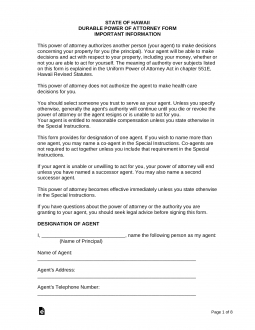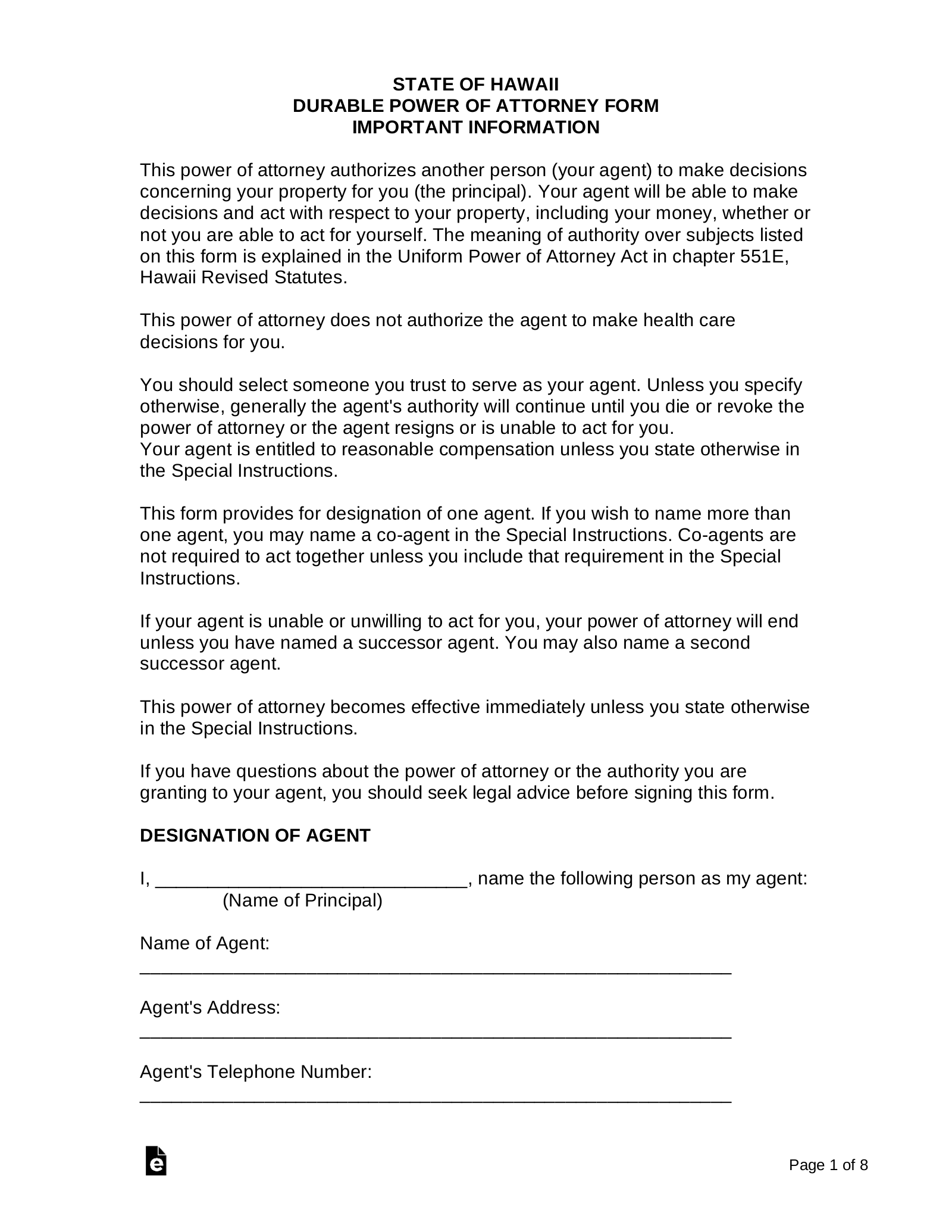Updated March 18, 2024
A Hawaii power of attorney represents a type of legal document that allows an individual (principal) to transfer authority to someone else (agent) to act in their place in certain circumstances and situations. It is common to complete an advance directive (for health care) and a durable power of attorney (for financial acts) so an agent can manage affairs even if the principal becomes incapacitated.
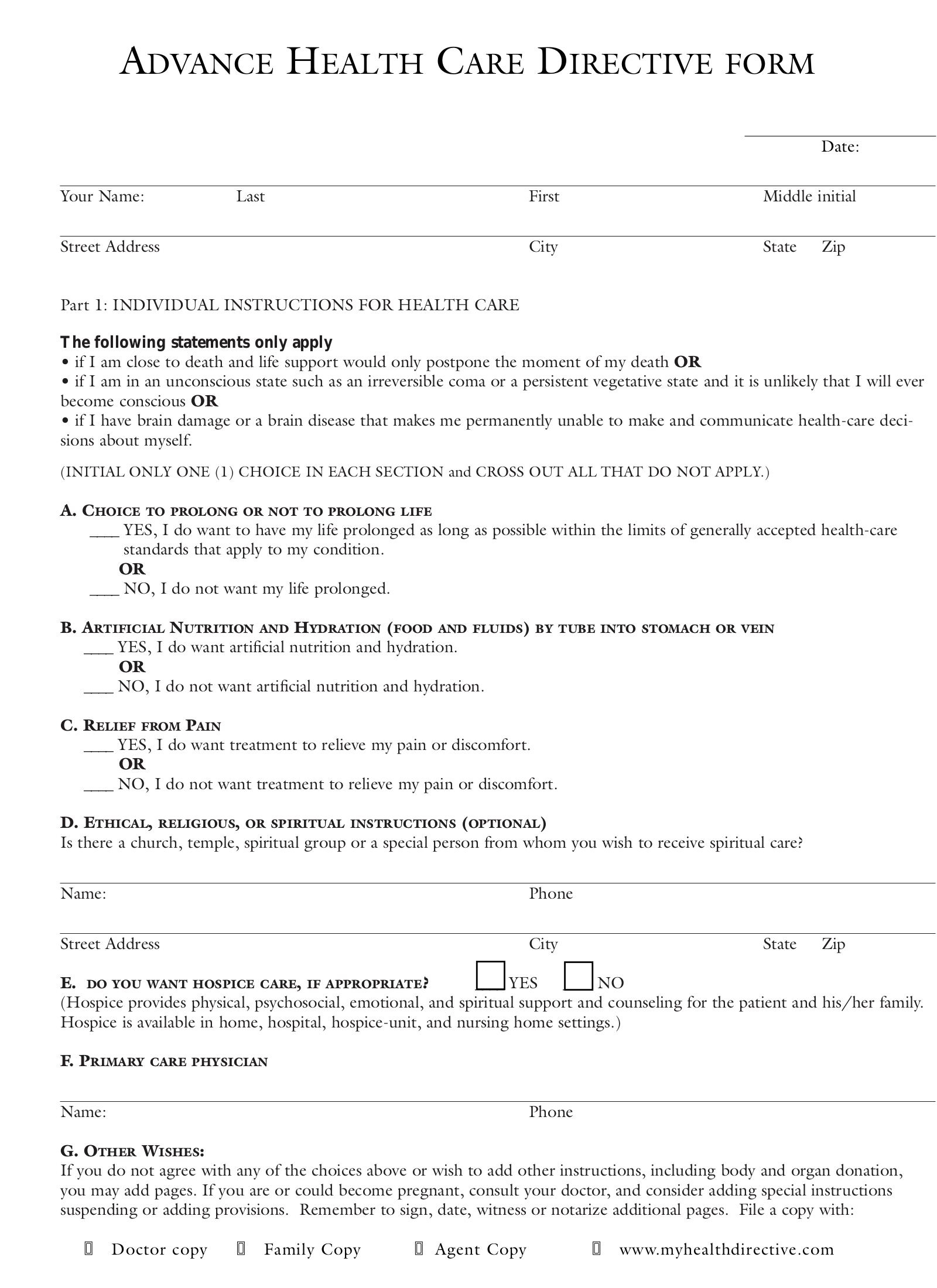 Advance Health Care Directive – Allows a person to choose an agent to make healthcare decisions on their behalf (medical power of attorney) and elect a course of care (living will). Advance Health Care Directive – Allows a person to choose an agent to make healthcare decisions on their behalf (medical power of attorney) and elect a course of care (living will).
Download: PDF Signing Requirements (§ 327E-3) – Two (2) witnesses or a notary public. |
 Durable (Statutory) Power of Attorney – Allows the designation of a trusted agent to continue to act on your behalf even in the event that you can no longer make decisions for yourself. Durable (Statutory) Power of Attorney – Allows the designation of a trusted agent to continue to act on your behalf even in the event that you can no longer make decisions for yourself.
Download: PDF, MS Word, OpenDocument Signing Requirements (§ 551E-3(b)) – Notary public. |
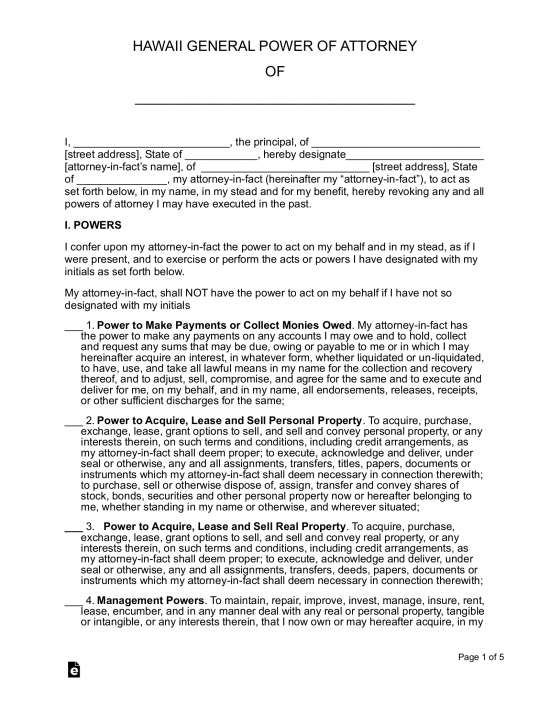 General (Financial) Power of Attorney – Unlike a durable power of attorney, this form becomes void if the principal becomes incapacitated. General (Financial) Power of Attorney – Unlike a durable power of attorney, this form becomes void if the principal becomes incapacitated.
Download: PDF, MS Word, OpenDocument Signing Requirements (§ 551E-3) – Notary public. |
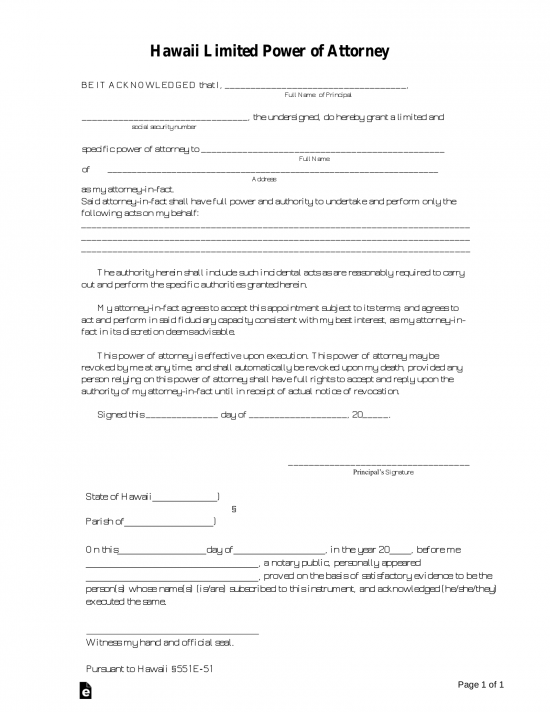 Limited Power of Attorney – Or “special,” as the name suggests, is used for limited or specific circumstances. Limited Power of Attorney – Or “special,” as the name suggests, is used for limited or specific circumstances.
Download: PDF, MS Word, OpenDocument Signing Requirements (§ 551E-3) – Notary public. |
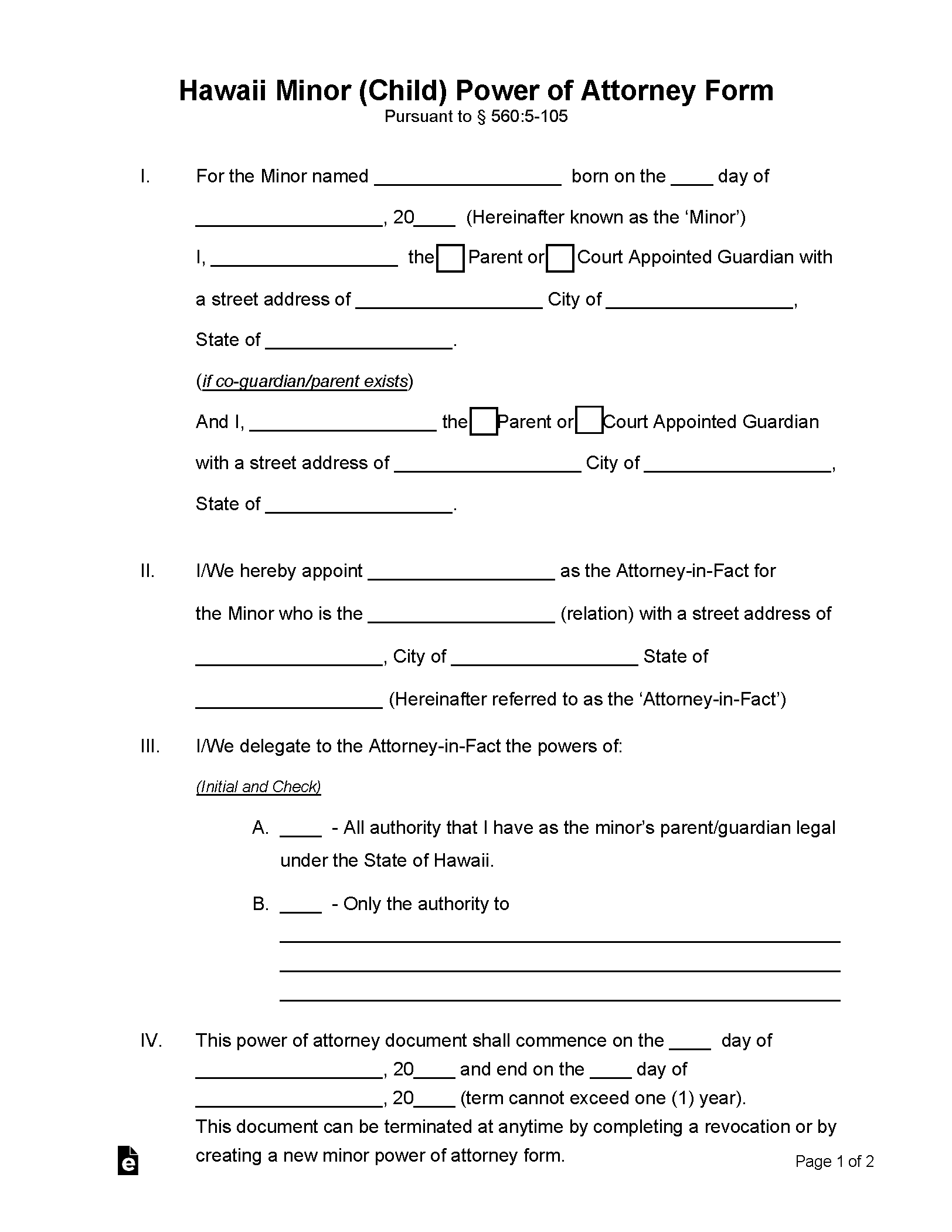 Minor (Child) Power of Attorney – Allows appointment of a guardian for a minor in the event the parents anticipate being deployed or otherwise unavailable. Minor (Child) Power of Attorney – Allows appointment of a guardian for a minor in the event the parents anticipate being deployed or otherwise unavailable.
Download: PDF, MS Word, OpenDocument Signing Requirements: No laws but mentioned to be notarized. |
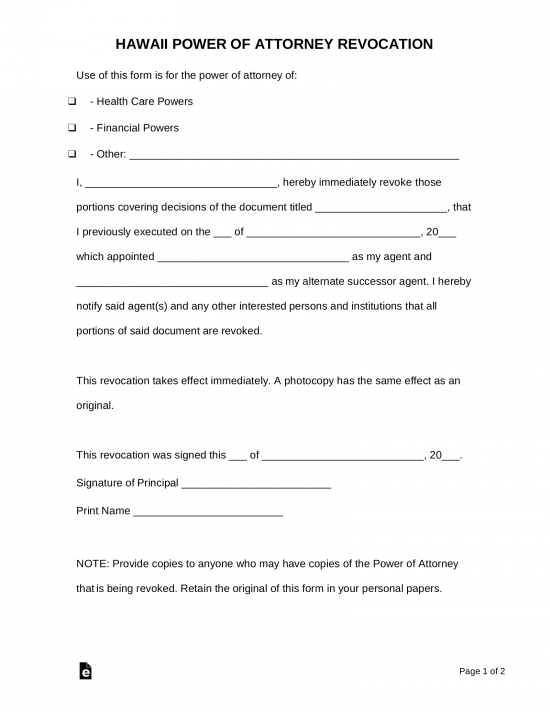 Power of Attorney for Revocation – This form is used to revoke any type of power of attorney, however, in addition to filling it out and signing it, the principal must notify the agent of cancellation and any institutions that may be relying on the original POA. Power of Attorney for Revocation – This form is used to revoke any type of power of attorney, however, in addition to filling it out and signing it, the principal must notify the agent of cancellation and any institutions that may be relying on the original POA.
Download: PDF, MS Word, OpenDocument Signing Requirements: No laws but recommended to be notarized. |
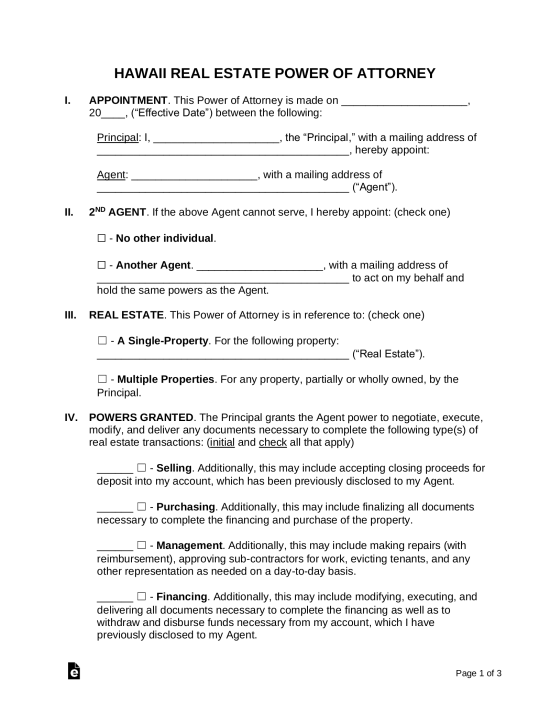 Real Estate Power of Attorney – To be used when a landlord would like to designate someone else to handle the purchase and sale of their property. May also be used for the agent selected to manage the premises. Real Estate Power of Attorney – To be used when a landlord would like to designate someone else to handle the purchase and sale of their property. May also be used for the agent selected to manage the premises.
Download: PDF, MS Word, OpenDocument Signing Requirements (§ 551E-3) – Notary public. |
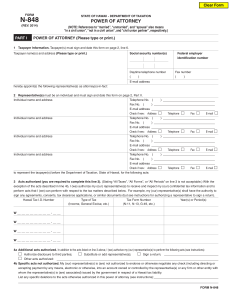 Tax Power of Attorney (Form N-848) – This form allows a principal to designate an accountant or other representative to represent them in front of the Department of Taxation. Tax Power of Attorney (Form N-848) – This form allows a principal to designate an accountant or other representative to represent them in front of the Department of Taxation.
Download: PDF Signing Requirements – Taxpayer and their representative. |
 Vehicle Power of Attorney (DMVL596-2-09) – This form lets you appoint a person to represent you with matters involving your motor vehicle and the county motor vehicle department. Vehicle Power of Attorney (DMVL596-2-09) – This form lets you appoint a person to represent you with matters involving your motor vehicle and the county motor vehicle department.
Download: PDF Signing Requirements – Vehicle owner and a notary public. |

